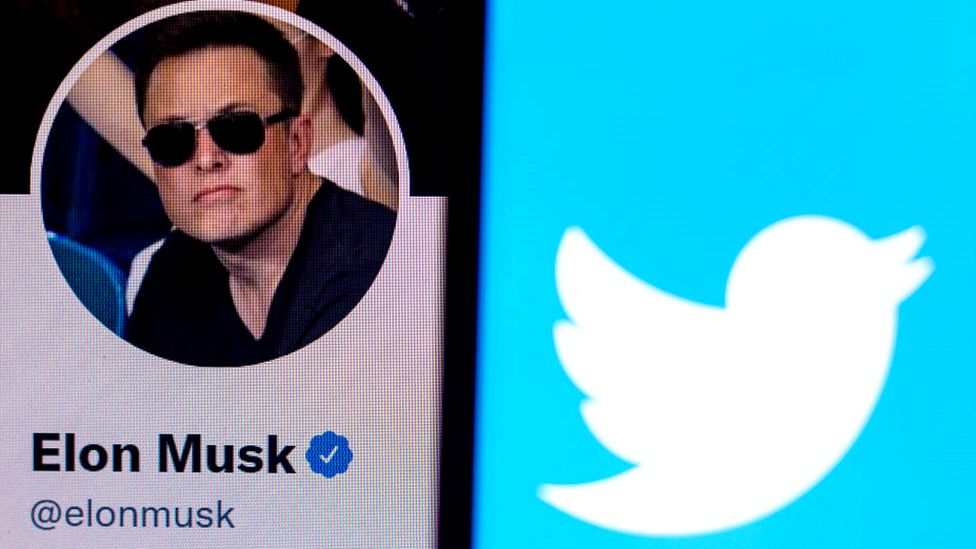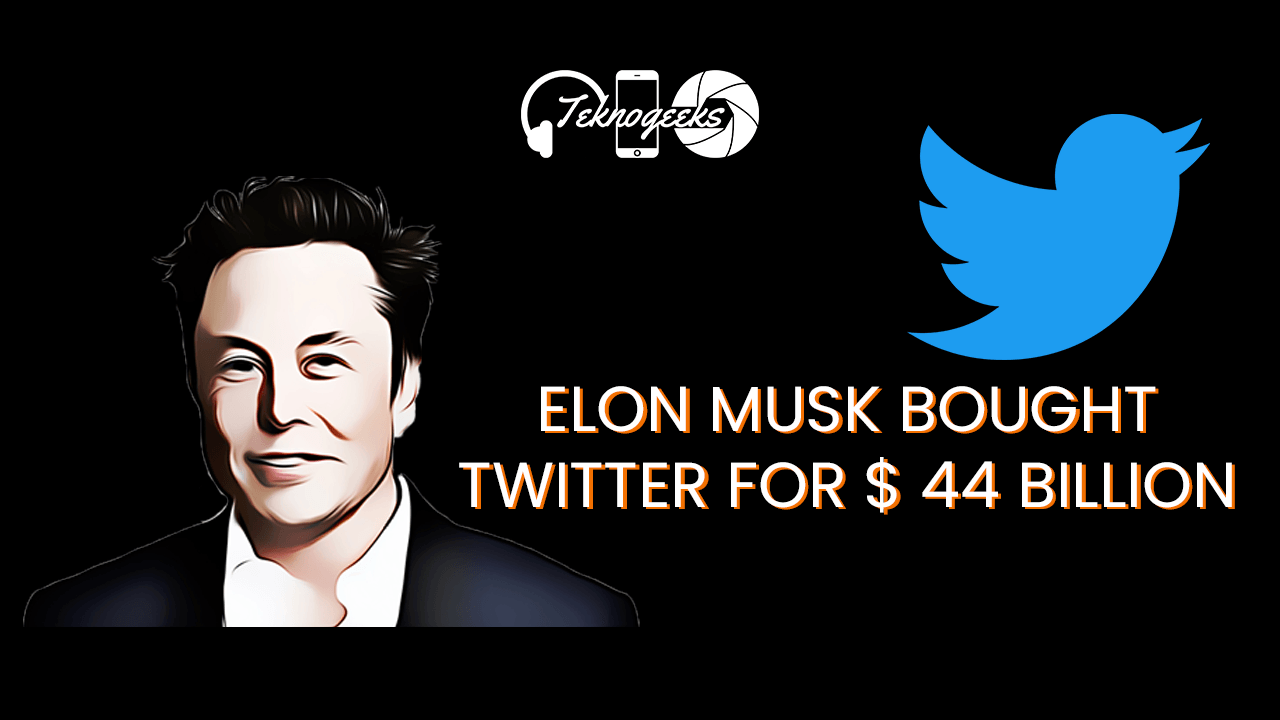Table of Contents
Twitter‘s board of directors has agreed to Elon Musk‘s $44 billion (£34.5 billion) takeover offer. Elon Musk buys Twitter.
Mr. Musk, who made the surprise bid less than two weeks ago, claimed that Twitter had “tremendous potential” that he would unleash.

He also demanded a slew of changes, ranging from loosening content restrictions to eliminating fake accounts.
The company initially turned down Mr. Musk’s offer, but it will now put the deal to a vote among shareholders.
According to Forbes magazine, Mr. Musk is the world’s richest person, with a net worth of $273.6 billion, owing largely to his ownership of electric vehicle maker Tesla, which he also runs. He is also the CEO of SpaceX, an aerospace company.
“Free speech is the bedrock of a functioning democracy, and Twitter is the digital town square where matters vital to the future of humanity are debated,” Mr. Musk said in a statement announcing the deal.
“I also want to make Twitter better than ever by enhancing the product with new features, making the algorithms open source to increase trust, defeating the spambots, and authenticating all humans,” he added.
“Twitter has tremendous potential – I look forward to working with the company and the community of users to unlock it.”
The move comes as politicians and regulators put increasing pressure on Twitter over the content that appears on its platform. Its efforts to moderate misinformation on the platform have drawn criticism from both the left and the right.
It banned former US President Donald Trump, perhaps its most powerful user, last year in one of its most high-profile moves, citing the risk of “incitement of violence.”
“A lot of people are going to be super unhappy with West Coast high tech as the de facto arbiter of free speech,” Mr. Musk said at the time.
The right in the United States has reacted positively to the news of the takeover, though Mr. Trump told Fox News on Monday that he had no plans to return to the platform.
“No matter who owns or runs Twitter, the president has long been concerned about the power of large social media platforms,” White House spokeswoman Jen Psaki told reporters.
The deal was described as an “extraordinary development in the world of social media” by Julian Knight, chairman of the UK’s Digital, Culture, Media, and Sport Committee, on Twitter.
“It will be interesting to see how a privately owned Twitter (run by a man who is a free speech absolutist) reacts to global regulatory efforts.”
According to BBC environment analyst Roger Harrabin, scientists are concerned about the takeover’s potential impact on the climate debate.
He points out that Twitter announced last week that it would prohibit advertisements that deny the scientific consensus on the climate crisis, acknowledging that false information can jeopardize environmental efforts.
That is why Elon Musk has been so keen on taking control of Twitter. Elon Musk buys Twitter, but why?
At first glance, the tale of Twitter and Elon Musk appears to be one of unrequited love.
Our unlikely couple begins with a power imbalance.
Elon Musk is a Twitter fanatic. With 83.8 million followers, he has a sizable following. He tweets a lot, sometimes controversially, and sometimes disastrously. After one tweet wiped $14 billion off Tesla’s stock price, the SEC barred him from tweeting about the company, and he was sued for defamation over a tweet about a cave diver in which he referred to him as a “pedo guy” (the cave diver lost).
He has, however, never left his keyboard.
Elon Musk, on the other hand, receives far less praise on Twitter.
You might think that someone doing you a favor by offering $44 billion for a 16-year-old company that hasn’t experienced the same exponential growth as its competitors was doing you a favor, and Twitter’s shareholders seem to agree.
Why?
Musk’s declaration that he wanted to see more “free speech” and less moderation alarmed the board. Many Republicans were ecstatic, as they had long believed that Twitter’s moderation policies favored the freedom of speech of left-wing viewpoints.
Regulators around the world are lining up to crack down on social networks and force them to take more responsibility for the content they carry, issuing steep fines for non-compliance on material that, among other things, incites violence, is abusive or qualifies as hate speech. The alarm bells are starting to ring.
Let’s not forget about the money. Musk wants to change Twitter’s main business model, which is based on advertising. He claims to be more interested in subscriptions, which could be difficult to sell in a world where all of the major social networks are free to use. Users on Twitter may decide that they don’t want their data to be used to monetize them and are willing to pay for it – but it’s a risk.
Cryptocurrencies are also a favorite of his. Could he use the platform to entice people to send money in unprotected, volatile currencies like Bitcoin?
And then there’s Elon Musk. He is the world’s richest man and a serial entrepreneur whose accomplishments include PayPal and Tesla. He’s charismatic and unfiltered, which makes him a dangerously loose cannon. He enjoys putting things to the test.
He didn’t want to be bound by the responsibility, which is why he declined to join Twitter’s board of directors after purchasing a 9.2 percent stake in January.
And he has a legion of adoring fans – I once tweeted that he doesn’t pay income tax because of the way his finances are structured (his wealth is largely based on shares rather than cash income, and he doesn’t own property).
How dare I say that he’s brilliant, and we should just be grateful for him, came the replies.
He didn’t want to be bound by the responsibility, which is why he declined to join Twitter’s board of directors after purchasing a 9.2 percent stake in January.
And he has a legion of adoring fans – I once tweeted that he doesn’t pay income tax because of the way his finances are structured (his wealth is largely based on shares rather than cash income, and he doesn’t own property).
How dare I say that he’s brilliant, and we should just be grateful for him, came the replies.
He hasn’t exactly wooed Twitter with flowers and chocolates; instead, this has been a brazen bid from a brazen businessman – no negotiating, no compromising.
Because this is a private sale of a private company rather than a merger of two giants, there are unlikely to be many regulatory hurdles.
If the 300 million people who use Twitter continue to do so, Musk’s Twitter would be a very different landscape. Perhaps a little more feisty and less liberal. He could reinstate Donald Trump, who is currently subject to a permanent ban, and given that Mr. Trump’s own attempt at a social network, Truth Social, appears to be failing, he would almost certainly welcome the opportunity.
It’s difficult to capture the collective opinion of Twitter’s users in a single sentence. According to my unscientific observation, for every tweet praising Musk, another threatens to leave. But when was the last time Twitter users agreed on anything?
Elon Musk has warned that he must safeguard Twitter users – Will Donald Trump Return?
After striking a $44 billion deal to buy Twitter, Elon Musk has been warned that he must protect Twitter users from harmful content.
Human rights groups are concerned that the billionaire’s promise to loosen content restrictions will lead to an increase in bullying and misinformation.
“All social media platforms, regardless of ownership, must be responsible,” Boris Johnson’s spokesman said.
Mr. Musk was also warned by the European Commission that he must protect users.
In a tweet, Thierry Breton, the EU executive’s commissioner for the internal market, warned that “whether it’s cars or social media, any company operating in Europe must comply with our rules – regardless of their shareholding.”
According to the European Union, its new online rules will “overhaul” the digital market, including how tech giants operate.
When they go into effect, there will need to be more transparency about why users are being recommended certain content or targeted with certain ads, for example.
‘Bedrock of democracy’
Mr Musk, a self-described “free speech absolutist,” has been outspoken in his criticism of Twitter’s content moderation policies, arguing that the platform must be a genuine forum for free speech.
“Free speech is the bedrock of a functioning democracy, and Twitter is the digital town square where important issues affecting humanity’s future are debated,” he said when the deal was announced.
Politicians and regulators are putting increasing pressure on social media companies over the content that appears on its platform. Its efforts to combat misinformation have drawn criticism from both the left and the right.
It banned former US President Donald Trump, perhaps its most powerful user, last year in one of its most high-profile moves, citing the risk of “incitement of violence.”
However, Twitter founder Jack Dorsey, who remains on the board of directors, welcomed Mr. Musk’s takeover in a series of tweets, describing him as “the singular solution I trust.”
He claimed that Wall Street had “owned” the company and that Mr. Musk’s decision to delist the stock and take it private was the “right first step.”
He stated that Twitter “will continue to serve the public conversation,” but that “no one should own or run Twitter.”
“We are concerned with any steps that Twitter might take to erode enforcement of the policies and mechanisms designed to protect users,” Amnesty International said in a Twitter thread.
A BBC request for comment on the concerns raised was not immediately responded to by Twitter.
Mr. Musk’s $44 billion (£34.5 billion) offer was unanimously accepted by Twitter’s 11-member board.
Parag Agrawal, the CEO of Twitter, also addressed employees at a meeting, saying the company’s future was uncertain.
“We don’t know which direction the platform will go once the deal closes,” Mr. Agrawal reportedly said.
Will people leave Twitter?
Mr. Musk expressed his hope that even his harshest critics will continue to use the platform “because that is what free speech means.”
Some Twitter users, on the other hand, have threatened to leave, while others have already done so.
The platform will “become an, even more, lawless, hateful, xenophobic, bigoted, misogynistic space,” according to British actor Jameela Jamil, who is best known for her role in the TV series The Good Place.
Ms. Jamil told her one million followers, “I’d like this to be my… last tweet.”
Meanwhile, Caroline Orr Bueno, a postdoctoral researcher at the University of Maryland, said she will remain on the platform for the time being because she has over 450,000 followers.
“We have no idea what it will look like under Elon Musk’s leadership,” Ms. Bueno said.
“What we do know is that if everyone who is decent leaves, things will get a lot worse here a lot faster,” she added.
According to the BBC, most users will “take a wait-and-see approach,” according to Dan Ives, an analyst at investment firm Wedbush Securities.
Mr. Ives explained, “Now it’s about courting new users and keeping defectors off the platform.”
Regardless of who owns or runs Twitter, White House spokeswoman Jen Psaki told reporters on Monday that US President Joe Biden “has long been concerned about the power of large social media platforms.”
Senator Elizabeth Warren, a Democrat, called the agreement “dangerous for our democracy,” and called for a wealth tax and “strong rules to hold Big Tech accountable.”
Senator Marsha Blackburn, a Republican, hailed the agreement as “an encouraging day for freedom of speech.”
The Controversial History of Musk and Twitter
Mr. Musk, who has more than 80 million Twitter followers, has a tumultuous history on the platform.
US financial regulators accused him of misleading Tesla investors with his tweets in 2018, allegations that were settled for $40 million and which Mr. Musk continues to deny.
In 2019, he was sued for defamation, which he won, after calling a diver involved in the rescue of schoolboys in Thailand “pedo guy” on the platform.
Mr. Musk, who has a history of squabbling with journalists and blocking critics, suggested on Monday that he saw Twitter as a place for debate.
He wrote just hours before the deal, “I hope that even my harshest critics remain on Twitter because that is what free speech means.”

